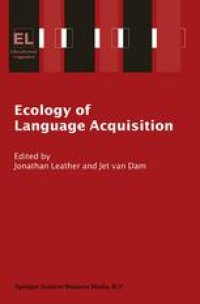
Ebook: Ecology of Language Acquisition
- Tags: Linguistics (general), Psycholinguistics, Linguistic Anthropology, Artificial Intelligence (incl. Robotics)
- Series: Educational Linguistics 1
- Year: 2003
- Publisher: Springer Netherlands
- Edition: 1
- Language: English
- pdf
While most research on language acquisition continues to consider the individual primarily in closed-system terms, Ecology of Language Acquisition emphasizes the emergence of linguistic development through children's and learners' interactions with their environment - spatial, social, cultural, educational, and so on - bringing to light commonalities between primary language development, child and adult second-language learning, and language acquisition by robots. Such a situated, context-responsive perspective on acquisition is able to interrelate insights from a variety of paradigms and disciplines while avoiding unjustifiable appeals to normativity. The theoretical and empirical studies presented here challenge a number of dominant ideas in language acquisition theory and mark an important new research orientation. This work should be of interest to language acquisition researchers and professionals in a wide range of specialisms.
While most research on language acquisition continues to consider the individual primarily in closed-system terms, Ecology of Language Acquisition emphasizes the emergence of linguistic development through children's and learners' interactions with their environment - spatial, social, cultural, educational, and so on - bringing to light commonalities between primary language development, child and adult second-language learning, and language acquisition by robots. Such a situated, context-responsive perspective on acquisition is able to interrelate insights from a variety of paradigms and disciplines while avoiding unjustifiable appeals to normativity. The theoretical and empirical studies presented here challenge a number of dominant ideas in language acquisition theory and mark an important new research orientation. This work should be of interest to language acquisition researchers and professionals in a wide range of specialisms.
While most research on language acquisition continues to consider the individual primarily in closed-system terms, Ecology of Language Acquisition emphasizes the emergence of linguistic development through children's and learners' interactions with their environment - spatial, social, cultural, educational, and so on - bringing to light commonalities between primary language development, child and adult second-language learning, and language acquisition by robots. Such a situated, context-responsive perspective on acquisition is able to interrelate insights from a variety of paradigms and disciplines while avoiding unjustifiable appeals to normativity. The theoretical and empirical studies presented here challenge a number of dominant ideas in language acquisition theory and mark an important new research orientation. This work should be of interest to language acquisition researchers and professionals in a wide range of specialisms.
Content:
Front Matter....Pages I-XI
Towards an Ecology of Language Acquisition....Pages 1-29
Critical Realism, Ecological Psychology, and Imagined Communities....Pages 31-47
A Tale of Two Computer Classrooms....Pages 49-63
From Joint Attention to Language Acquisition....Pages 65-81
Beyond Cognitive Determination....Pages 83-106
Language Socialization in Children’s Religious Education....Pages 107-121
An Integrational Linguistic View of Coming into Language....Pages 123-139
The Ecology of An Sla Community in a Computer-Mediated Environment....Pages 141-158
Robot Babies....Pages 159-181
Borrowing Words....Pages 183-202
Language Acquisition Behind the Scenes....Pages 203-221
Back Matter....Pages 223-225
While most research on language acquisition continues to consider the individual primarily in closed-system terms, Ecology of Language Acquisition emphasizes the emergence of linguistic development through children's and learners' interactions with their environment - spatial, social, cultural, educational, and so on - bringing to light commonalities between primary language development, child and adult second-language learning, and language acquisition by robots. Such a situated, context-responsive perspective on acquisition is able to interrelate insights from a variety of paradigms and disciplines while avoiding unjustifiable appeals to normativity. The theoretical and empirical studies presented here challenge a number of dominant ideas in language acquisition theory and mark an important new research orientation. This work should be of interest to language acquisition researchers and professionals in a wide range of specialisms.
Content:
Front Matter....Pages I-XI
Towards an Ecology of Language Acquisition....Pages 1-29
Critical Realism, Ecological Psychology, and Imagined Communities....Pages 31-47
A Tale of Two Computer Classrooms....Pages 49-63
From Joint Attention to Language Acquisition....Pages 65-81
Beyond Cognitive Determination....Pages 83-106
Language Socialization in Children’s Religious Education....Pages 107-121
An Integrational Linguistic View of Coming into Language....Pages 123-139
The Ecology of An Sla Community in a Computer-Mediated Environment....Pages 141-158
Robot Babies....Pages 159-181
Borrowing Words....Pages 183-202
Language Acquisition Behind the Scenes....Pages 203-221
Back Matter....Pages 223-225
....